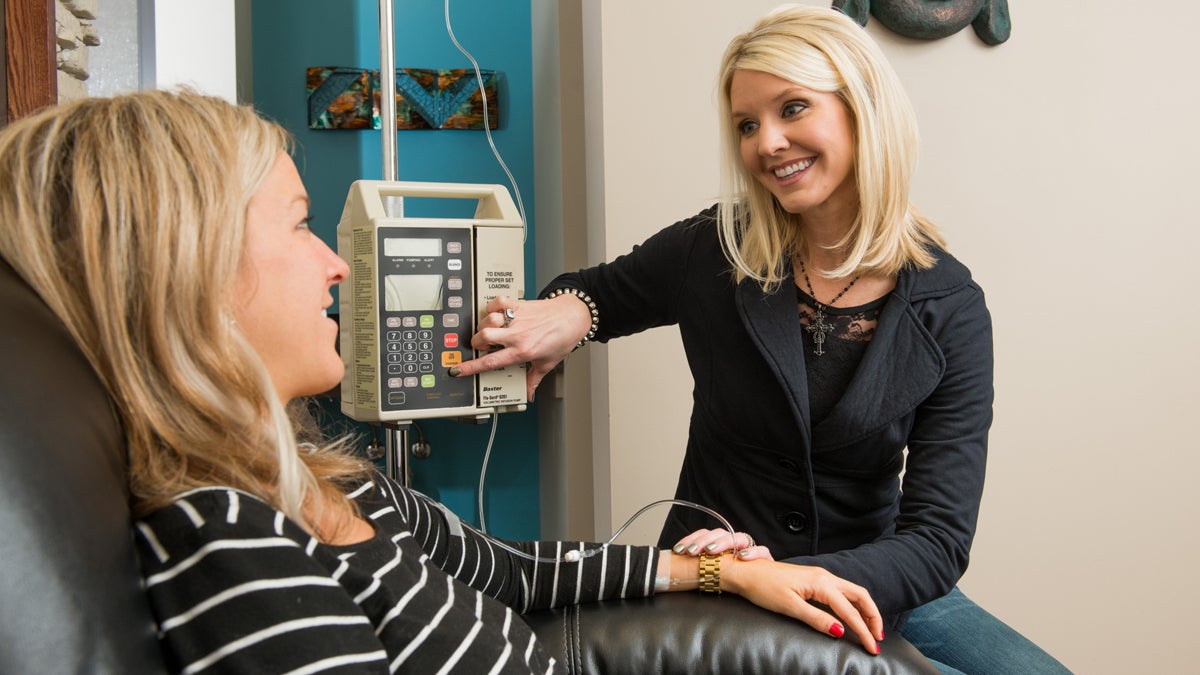New Malvern clinic offers infusion therapy — and more options for patients

(Image courtesy of Infusion Express)
The CEO of a new health care business in Malvern, Pennsylvania, said his company is looking to disrupt the health care industry by offering more convenience to people with chronic illness.
Infusion Express provides intravenous medicine to low-risk patients.
The company’s sales pitch includes free parking, comfy treatment chairs, Wi-Fi — and appointments available in the evening and on weekends. Getting a similar prescription infusion at a hospital-based center can take twice as long, said CEO Don Peterson.
“They won’t order the drugs for you from their own pharmacy until you are sitting in the seat. With patients that we know who’ve been with us at least once or twice, we tell them to call us when they leave the house, and we’ll prepare their drug before they even arrive,” Peterson said.
The company is part of a health care trend to move outpatient services away from the hospital to standalone clinics.
“That’s a trend that started for DaVita [the dialysis and kidney-care company] 15 years ago, and they are a very successful company,” Peterson said.
“It becomes less expensive, quite frankly, because the hospital is allowed to charge more than we can charge. Hospitals get a percentage of gross charge on the drugs, and they are allowed to charge — by law — four times for the labor associated to the administration of the drug,” Peterson said. “It’s not our choice to be lower cost, it’s just the way it is.”
Peterson’s ideal patient is someone who’s reasonably healthy but with a chronic condition that needs management.
Some patients need to be in a hospital environment, Peterson said, with an emergency room nearby because they are high risk; that’s not the customer base he’s seeking.
Many Infusion Express patients have an autoimmune disease such as lupus or rheumatoid arthritis.
At an Infusion Express location in Kansas, 35-year-old Alex Rossow said there’s a family room where his two young daughters can play while he gets his monthly treatment for bowel disease.
“I feel like I’m in my own living room … that’s not the feeling I get at the hospital,” Rossow said.
He was looking for an alternative in 2013 when he started going to an Infusion Express site in Missouri.
“I just had a lot of bad connotations of hospitals because of all the surgeries I’ve had for my Crohn’s disease,” Rossow said.
The customer service is pretty good too, he said, adding that he’s not so tied up with insurance phone calls anymore.
“I don’t have to worry about pre-approval or about calling the pharmacy to have the drug shipped, they take care of that. Having Crohn’s — or a chronic illness — is stressful enough,” he said. “They also relieve that stress for me.”
Following the Uber trail
In Pennsylvania, infusion Express already has financial agreements with Medicare. The company is still working to get the region’s biggest health insurer — Independence Blue Cross — to designate the company as in-network health care provider.
Peterson has an Uber-sized vision for his company. When the taxi-alternative moves into a new market, he said, the company often get lots of opposition from the local government and other transportation outlets.
“We encounter some similar things as we talk to insurance, hospitals and others, who are resisting, hanging on to the past,” he said.
Peterson says he hasn’t seen any research indicating whether an ambulatory clinic is safer than a hospital setting for getting an infusion.
“But what I do know is this — there are statistics that talk about hospital-acquired infections. Those statistics indicate that some 100,000 people a year die from infections they acquire at the hospital,” he said. “That’s not to say that they could never acquire an infection from one of our environments. But we don’t have the population of people with the variety of conditions running through our environment that they have in a hospital.”
This disclosure: Independence Blue Cross supports WHYY.
WHYY is your source for fact-based, in-depth journalism and information. As a nonprofit organization, we rely on financial support from readers like you. Please give today.

